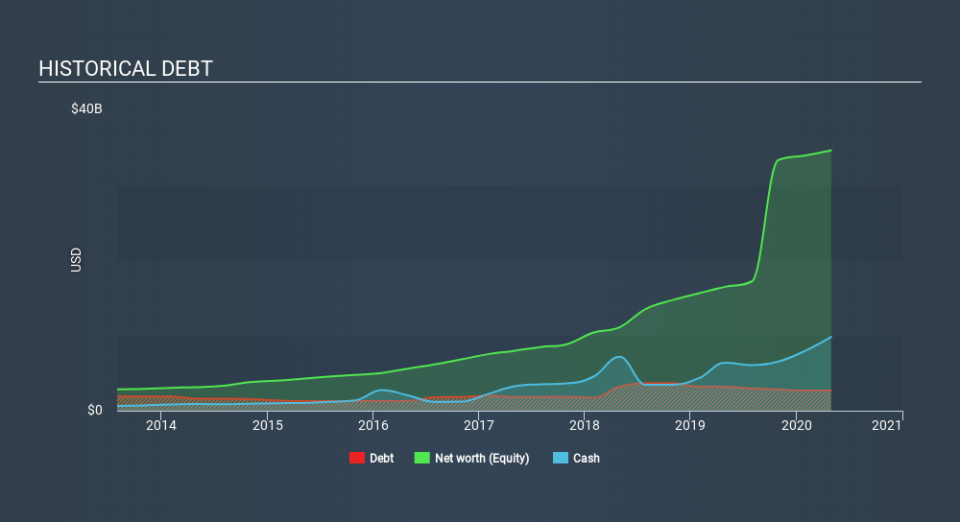salesforce.com (NYSE:CRM) Has A Pretty Healthy Balance Sheet

Warren Buffett famously said, 'Volatility is far from synonymous with risk.' So it might be obvious that you need to consider debt, when you think about how risky any given stock is, because too much debt can sink a company. We note that salesforce.com, inc. (NYSE:CRM) does have debt on its balance sheet. But should shareholders be worried about its use of debt?
When Is Debt A Problem?
Debt is a tool to help businesses grow, but if a business is incapable of paying off its lenders, then it exists at their mercy. Part and parcel of capitalism is the process of 'creative destruction' where failed businesses are mercilessly liquidated by their bankers. However, a more usual (but still expensive) situation is where a company must dilute shareholders at a cheap share price simply to get debt under control. Of course, the upside of debt is that it often represents cheap capital, especially when it replaces dilution in a company with the ability to reinvest at high rates of return. When we examine debt levels, we first consider both cash and debt levels, together.
Check out our latest analysis for salesforce.com
What Is salesforce.com's Net Debt?
The image below, which you can click on for greater detail, shows that salesforce.com had debt of US$2.68b at the end of April 2020, a reduction from US$3.17b over a year. However, it does have US$9.80b in cash offsetting this, leading to net cash of US$7.13b.
How Healthy Is salesforce.com's Balance Sheet?
The latest balance sheet data shows that salesforce.com had liabilities of US$12.8b due within a year, and liabilities of US$6.22b falling due after that. Offsetting this, it had US$9.80b in cash and US$3.53b in receivables that were due within 12 months. So its liabilities total US$5.73b more than the combination of its cash and short-term receivables.
Of course, salesforce.com has a titanic market capitalization of US$163.4b, so these liabilities are probably manageable. However, we do think it is worth keeping an eye on its balance sheet strength, as it may change over time. Despite its noteworthy liabilities, salesforce.com boasts net cash, so it's fair to say it does not have a heavy debt load!
In fact salesforce.com's saving grace is its low debt levels, because its EBIT has tanked 74% in the last twelve months. Falling earnings (if the trend continues) could eventually make even modest debt quite risky. The balance sheet is clearly the area to focus on when you are analysing debt. But ultimately the future profitability of the business will decide if salesforce.com can strengthen its balance sheet over time. So if you want to see what the professionals think, you might find this free report on analyst profit forecasts to be interesting.
Finally, a business needs free cash flow to pay off debt; accounting profits just don't cut it. While salesforce.com has net cash on its balance sheet, it's still worth taking a look at its ability to convert earnings before interest and tax (EBIT) to free cash flow, to help us understand how quickly it is building (or eroding) that cash balance. Happily for any shareholders, salesforce.com actually produced more free cash flow than EBIT over the last three years. That sort of strong cash conversion gets us as excited as the crowd when the beat drops at a Daft Punk concert.
Summing up
While it is always sensible to look at a company's total liabilities, it is very reassuring that salesforce.com has US$7.13b in net cash. And it impressed us with free cash flow of US$3.4b, being 667% of its EBIT. So we are not troubled with salesforce.com's debt use. There's no doubt that we learn most about debt from the balance sheet. However, not all investment risk resides within the balance sheet - far from it. Consider for instance, the ever-present spectre of investment risk. We've identified 2 warning signs with salesforce.com , and understanding them should be part of your investment process.
If you're interested in investing in businesses that can grow profits without the burden of debt, then check out this free list of growing businesses that have net cash on the balance sheet.
Love or hate this article? Concerned about the content? Get in touch with us directly. Alternatively, email editorial-team@simplywallst.com.
This article by Simply Wall St is general in nature. It does not constitute a recommendation to buy or sell any stock, and does not take account of your objectives, or your financial situation. We aim to bring you long-term focused analysis driven by fundamental data. Note that our analysis may not factor in the latest price-sensitive company announcements or qualitative material. Simply Wall St has no position in any stocks mentioned. Thank you for reading.

 Yahoo Finance
Yahoo Finance 
